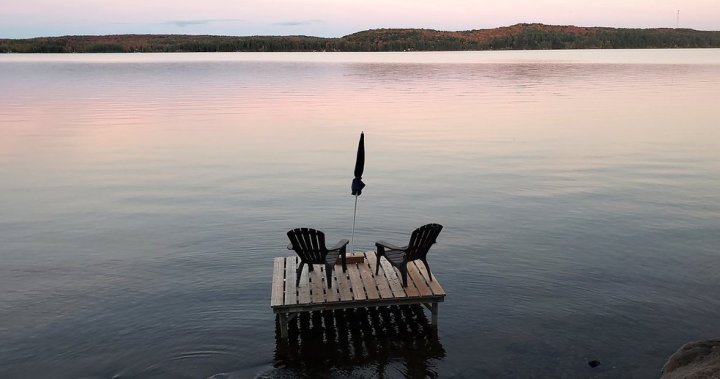Dreaming of a lakeside cottage but can’t afford it? Co-ownership could open that door

A lakeview cottage with cosy rooms, a sandy beach nearby and a dock to gaze into the sunset was the dream for Corrine Evanoff.
“For years, I’ve been on this journey of trying to find a cottage that would work for us,” she said.
But Evanoff and her husband didn’t want to incur the burden of constant cottage maintenance — spending vacation days fixing decks and pruning trees. They opted instead to rent over the years, still hoping to one day buy.
Then, it happened. They found a cottage not too far from home — for a fraction of the price they thought they’d have to pay, thanks to fractional ownership.
Also called co-ownership, it allows people to buy a share of a property with others, whether it’s family, friends or even strangers.
Affordability sits at the heart of fractionally owned cottages. Many Canadians still find themselves priced out of the market, even as cottage prices have declined from peaks seen during the pandemic.
Re/Max brokers and agents anticipate a national average price increase of about 1.8 per cent across the Canadian recreational market in 2025, a May report by the real estate firm, showed.
On their first visit to check out a prospective cottage last fall, Evanoff recalled walking into a lake-facing cottage with large windows at Frontenac Shores in Cloyne, Ont., about 300 kilometres northeast of Toronto, and was sold.
“We sat in these Muskoka chairs on the beach and our feet are in the water, and I just felt the stress shredding off me,” she said.
“This is the dream that I’ve been dreaming for all these years … and this is within reach.”

Evanoff and her husband now own one-tenth of a million-dollar cottage, costing them less than $100,000 for their share — and affording them five weeks a year at the property.
Fractional ownership of a cottage is not like a timeshare, said Realtor Mike Lange, who has been dealing with co-owned cottages for about seven years in Kawartha Lakes, Ont.

Get daily National news
Get the day’s top news, political, economic, and current affairs headlines, delivered to your inbox once a day.
“With a timeshare, you put your name in requesting a location, you have no guarantee that that’s going to be available,” he said. “There’s been a lot of heartaches over them over the years.”
Timeshare properties can be owned by for-profit corporations, leaving less autonomy for those staying there.
Don Smith, who co-owns a property in Kawartha Lakes, bought into a cottage in the mid-2000s after he saw a newspaper ad about fractional cottage ownership.
“I was in the staff room reading the newspaper as a mathematics and computer studies teacher,” he recalled. “As a math teacher, that caught my eye: What’s this fraction all about, this cottage, this idea?”
For the Smiths, fractional ownership wasn’t a financial investment but a lifestyle investment that has paid off over the past two decades.
“This is where my daughter learned to swim, that’s where my daughter learned to kayak, that is when my daughter had learned to appreciate animals.”
But it may not be for everyone.
Smith said fractionally owned cottages are usually 100 per cent debt-free. That means new co-owners typically can’t secure a mortgage against the property from traditional banks and will have to rely on personal loans or a line of credit to buy their share.
Personal touches to the cottage can also be missing with fractional ownership and people can’t just show up at any time, he said.
“It’s not like you can personally put all your favourite pictures and put all of the junk that you don’t want in your home garage and take it up there and leave it,” Smith said.
Real estate developer John Puffer has years of experience building cottages and selling them in fractional ownership arrangements in Ontario’s cottage country regions.
When he first got into the business, Puffer assumed the buyers would mostly be people in their 30s with young families. Instead, they happened to be people in their 50s and 60s, buying cottage shares for their adult children and grandchildren, or people who don’t want to commit the dollars and worry about maintenance.
“That is part of the Canadian cottage experience in Ontario … that’s where families congregate at the cottage and (it’s) multi-generations,” said Puffer, president of Chandler Point Corp.
Tanya Walker, litigation lawyer and managing partner at Walker Law, suggests potential buyers should get a good contract lawyer and treat the contract “as if it’s a pre-nuptial agreement” before signing on to be a co-owner.
She said buyers going into fractional ownership should ask questions about who the other co-owners are, the voting rights people get for their share and what happens when they want to sell their stake.
Walker added it’s also important to look into who manages the property, the financials of the property as well as how much time you’ll get to use the cottage and when.
Puffer said people really have to understand what they’re buying into. He suggested people read the contract and find out who’s in control, what their obligations are, and talk to people who already own.
For Evanoff and her husband, it will be their third time heading up to the Frontenac Shores cottage next month.
“It’s like, wow! That just seems like a gift,” she said.
“This (fractional ownership) seems like the best-kept secret but I think it’s going to catch on … and you’re going to see a lot of people tap into this market.”


TORONTO – An old bat was a difference-maker for the Toronto Blue Jays in a wild 9-8 victory over the Minnesota Twins on Wednesday night.
Ty France sparked an eighth-inning rally with a solo homer and Addison Barger emerged from a 2-for-30 slump with a two-run double to help the Blue Jays to their AL-best 40th comeback win of the year.
Barger said France “randomly decided” to use one of his old bats from the cage before his pinch-hit appearance.
“I haven’t seen the bat since last year and he had a homer with it,” Barger said. “And I was like, ‘Oh shoot, I’m going to use that.’ And it worked.”
Barger lined a slider from Michael Tonkin (2-1) off the top of the wall in right field to bring home Alejandro Kirk with the tying run and George Springer from first base with the go-ahead run.
Seranthony Dominguez (3-4) got two outs in the eighth inning for the win and closer Jeff Hoffman worked the ninth for his 29th save as Toronto (78-56) took the rubber game of the three-game series.
Related Videos
Toronto improved its record at Rogers Centre to 44-22, the best home mark in Major League Baseball at the end of the game.

Get breaking National news
For news impacting Canada and around the world, sign up for breaking news alerts delivered directly to you when they happen.
Barger became a regular in the lineup early in the season after providing consistent pop at the plate. Despite his struggles in recent weeks, he remains unfazed by late-game pressure.
With runners in scoring position in the seventh inning or later this season, Barger is hitting .389 with a 1.161 OPS (on-base plus slugging).
“Addy’s got talent,” said Blue Jays manager John Schneider. “He can do that. We’ve seen him do that, we’ve seen him hit home runs.
“I think it’s just the natural course of the season for a young guy and I think he’s navigating it pretty well.”
On the mound, Schneider went right back to Hoffman a night after he gave up two homers and blew his seventh save of the season.
“It’s like a quarterback throwing an interception,” Schneider said. “You’ve got to have a short memory and you’ve got to move on to the next thing. And you know, Hoff, like everybody else on this team, they move on to the next thing.”
The game had eight solo homers — four from each team — and Toronto clawed back from three deficits before taking its first lead in the eighth.
Only the Los Angeles Dodgers (41) have had more comeback wins.
“These guys do not quit,” Schneider said. “They do not give a (crap) who they’re playing against. They don’t care what the situation is. I love it.”
Andres Gimenez and Davis Schneider, with a pair, also went deep for Toronto. Byron Buxton, with two, Luke Keaschall and Brooks Lee homered for the Twins (60-73).
Toronto starter Eric Lauer allowed six earned runs and 10 hits over 4 2/3 innings. He had four strikeouts.
Minnesota starter Simeon Woods Richardson gave up five earned runs and five hits over 3 2/3 frames. He walked a pair and fanned two.
Toronto maintained its four-game lead on Boston in the American League East Division standings. The Red Sox edged Baltimore 3-2.
The Blue Jays will continue their six-game homestand Friday night against the MLB-leading Milwaukee Brewers. Shane Bieber (1-0, 1.50 earned-run average) is tabbed to start for Toronto.
This report by The Canadian Press was first published Aug. 27, 2025.
© 2025 The Canadian Press

TORONTO – Addison Barger hit a two-run double in Toronto’s three-run eighth inning as the Blue Jays came back for a 9-8 win over the Minnesota Twins on Wednesday night.
Barger drove a ball into the right-centre field gap to score Alejandro Kirk with the tying run and George Springer with the go-ahead run.
Seranthony Dominguez (3-4) got two outs in the eighth inning for the win and closer Jeff Hoffman worked the ninth for his 29th save as Toronto took the rubber game of the three-game series.
Each team hit four home runs. All eight blasts were solo shots.
Related Videos
Davis Schneider, with a pair, Andres Gimenez and Ty France, who hit a pinch-hit homer to start the rally in the eighth, went deep for Toronto (78-56).

Get daily National news
Get the day’s top news, political, economic, and current affairs headlines, delivered to your inbox once a day.
Byron Buxton, with two, Luke Keaschall and Brooks Lee went deep for the Twins (60-73).
Toronto starter Eric Lauer allowed six earned runs and 10 hits over 4 2/3 innings. He had four strikeouts.
Minnesota starter Simeon Woods Richardson gave up five earned runs and five hits over 3 2/3 frames. He walked a pair and fanned two.
Michael Tonkin (2-1) blew the save and took the loss.
Toronto maintained its four-game lead on Boston in the American League East Division standings. The Red Sox edged Baltimore 3-2.
KEY MOMENT
Blue Jays centre-fielder Daulton Varsho put a charge into the sellout crowd of 42,361 with his catch against the wall in the second inning. He made another brilliant catch in virtually the same spot in the third.
KEY STAT
Toronto owns the best home record in the AL at 44-22.
UP NEXT
The Blue Jays will continue their six-game homestand Friday against the Milwaukee Brewers. Shane Bieber (1-0, 1.50 earned-run average) has been tabbed to start for Toronto.
The Twins will return home for a seven-game homestand starting Friday against the San Diego Padres.
This report by The Canadian Press was first published Aug. 27, 2025.
© 2025 The Canadian Press

TORONTO – Addison Barger hit a two-run double in Toronto’s three-run eighth inning as the Blue Jays came back for a 9-8 win over the Minnesota Twins on Wednesday night.
Barger drove a ball into the right-centre field gap to score Alejandro Kirk with the tying run and George Springer with the go-ahead run.
Seranthony Dominguez (3-4) got two outs in the eighth inning for the win and closer Jeff Hoffman worked the ninth for his 29th save as Toronto took the rubber game of the three-game series.
Each team hit four home runs. All eight blasts were solo shots.
Related Videos
Davis Schneider, with a pair, Andres Gimenez and Ty France, who hit a pinch-hit homer to start the rally in the eighth, went deep for Toronto (78-56).

Get breaking National news
For news impacting Canada and around the world, sign up for breaking news alerts delivered directly to you when they happen.
Byron Buxton, with two, Luke Keaschall and Brooks Lee went deep for the Twins (60-73).
Toronto starter Eric Lauer allowed six earned runs and 10 hits over 4 2/3 innings. He had four strikeouts.
Minnesota starter Simeon Woods Richardson gave up five earned runs and five hits over 3 2/3 frames. He walked a pair and fanned two.
Michael Tonkin (2-1) blew the save and took the loss.
Toronto maintained its four-game lead on Boston in the American League East Division standings. The Red Sox edged Baltimore 3-2.
KEY MOMENT
Blue Jays centre-fielder Daulton Varsho put a charge into the sellout crowd of 42,361 with his catch against the wall in the second inning. He made another brilliant catch in virtually the same spot in the third.
KEY STAT
Toronto owns the best home record in the AL at 44-22.
UP NEXT
The Blue Jays will continue their six-game homestand Friday against the Milwaukee Brewers. Shane Bieber (1-0, 1.50 earned-run average) has been tabbed to start for Toronto.
The Twins will return home for a seven-game homestand starting Friday against the San Diego Padres.
This report by The Canadian Press was first published Aug. 27, 2025.
© 2025 The Canadian Press
-

 Uncategorized3 months ago
Uncategorized3 months agoShop Proud, Eat Proud, Be Proud — Ottawa Canada Day Market This June 28th
-

 2 months ago
2 months agoCanada’s world junior trial saw juries tossed, intense testimony. Here’s a recap
-

 2 months ago
2 months agoMeasles circulating in northeastern B.C. community, health officials warn
-

 2 months ago
2 months agoRing of Fire road to bring prosperity to First Nation, problems for caribou: report
-

 3 months ago
3 months agoAnishinabek Nation chief says he briefed Ontario police on protests against Bill 5
-

 2 months ago
2 months agoJagmeet Singh apologizes for attending Kendrick Lamar concert after Drake calls him out
-

 2 months ago
2 months agoFormer major leaguer, Jays doctor Ron Taylor dies
-

 3 months ago
3 months agoArcelorMittal Long Products Canada closing wire drawing mill in Hamilton








